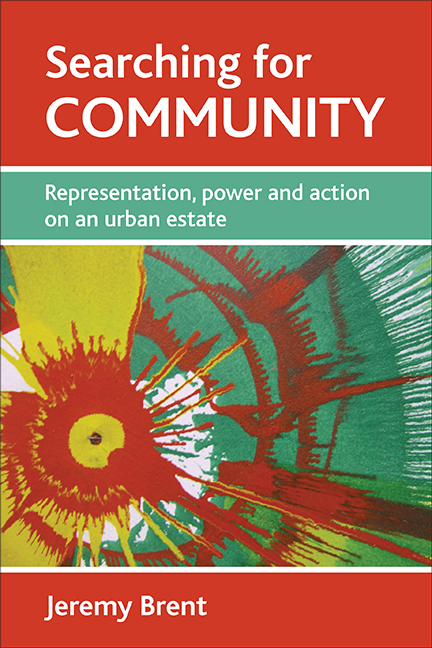Book contents
- Frontmatter
- Contents
- Foreword
- Notes on the author
- Introduction
- one Four settings: contexts and questions
- two Researching Southmead: problems of representation and participation
- three The intelligent outsider? Official and media representations of Southmead
- four Knowledge from within: community art and local representations
- five The outsider within: crossing worlds
- six Young people and community: trouble and tribes
- seven Four examples of community action in Southmead
- eight What is community anyway?
- nine Engaging with community
- ten Communicating what youth work achieves: the smile and the arch
- Author’s acknowledgements
- Epilogue: Southmead eight years on
- Afterword: Why Jeremy Brent’s work is more relevant than ever
- Bibliography
- Index
nine - Engaging with community
Published online by Cambridge University Press: 22 January 2022
- Frontmatter
- Contents
- Foreword
- Notes on the author
- Introduction
- one Four settings: contexts and questions
- two Researching Southmead: problems of representation and participation
- three The intelligent outsider? Official and media representations of Southmead
- four Knowledge from within: community art and local representations
- five The outsider within: crossing worlds
- six Young people and community: trouble and tribes
- seven Four examples of community action in Southmead
- eight What is community anyway?
- nine Engaging with community
- ten Communicating what youth work achieves: the smile and the arch
- Author’s acknowledgements
- Epilogue: Southmead eight years on
- Afterword: Why Jeremy Brent’s work is more relevant than ever
- Bibliography
- Index
Summary
Introduction
This thesis has not glossed over the complications and disorders of community, nor constructed unities or certainties where they cannot be found. It is what Plummer would call a late modernist story: ‘Modernist tales largely provide [a] sense of order, whereas emerging late modernist stories are drenched in ambiguity’. In this account, community as a claim to order has been replaced by community as a site of ambiguity. Ambiguity does not, however, reduce the imperative to engage with the issues raised: if anything, the imperative is increased. If young people take part in action that is both joyful and destructive, neither laissez-faire neglect nor disciplinarian policing can provide an effective response: a more serious engagement is necessary. Without certainty to rely on, engagement and action become more important, if more problematic, as facets of social life. This final chapter looks at some of the issues of engagement with community.
Engaging with, or for, some ‘thing’ as unattainable as community at first appears futile. If there is no achievable end, why make the effort? There is a persuasive argument, however, that it is because of the lack of a secure end that there exists such a strong desire for community and connectedness. Community illustrates what Zizek calls the ‘very paradox of desire’:
We mistake for postponement of the ‘thing itself ‘ what is already the ‘thing itself ‘, we mistake for the searching and indecision proper to desire what is, in fact, the realization of desire. That is to say, the realization of desire does not consist in its being ‘fulfilled’, ‘fully satisfied’, it coincides rather with the reproduction of desire as such, with its circular movement.
It is the desire to overcome the lack, the adversity of social life, that is itself community, and it is the desire, not the thing, that commands engagement. The desire for community has manifested itself in a number of at times contradictory ways throughout the book, ways that appear both destructive and constructive, and lead to no unified form of relationships or direction of social action. The desires of the different groupings themselves vary: desire, Zizek points out, is itself something that has to be constructed, he says, through fantasy, and these fantasies differ in their relationship to different discourses, and to transgression, control or change. Community demonstrates the importance of desires and fantasies as an intrinsic part of social life.
- Type
- Chapter
- Information
- Searching for CommunityRepresentation, Power and Action on an Urban Estate, pp. 241 - 262Publisher: Bristol University PressPrint publication year: 2009



